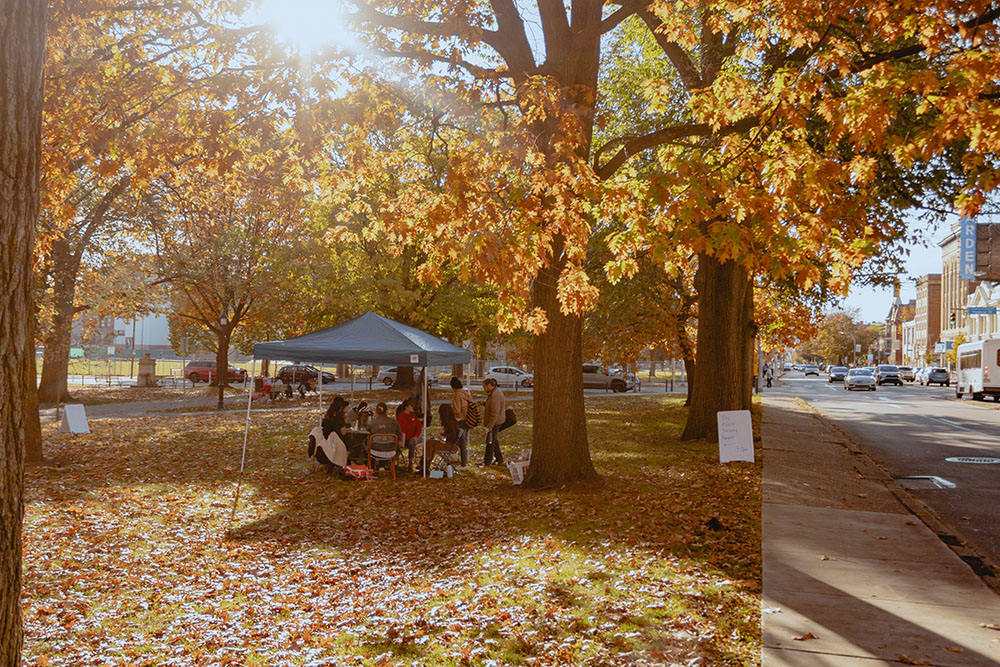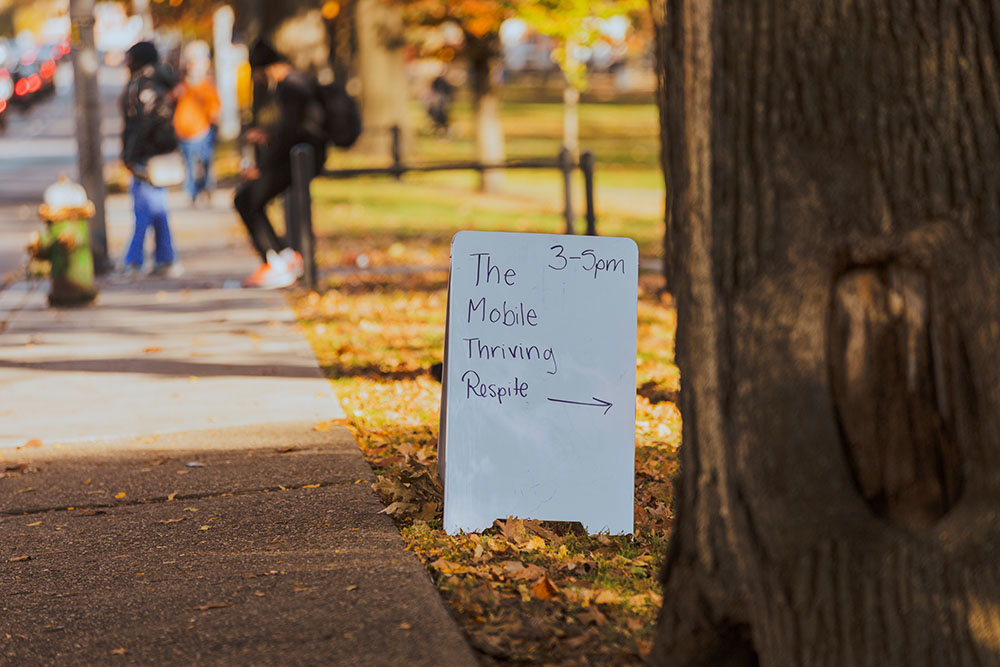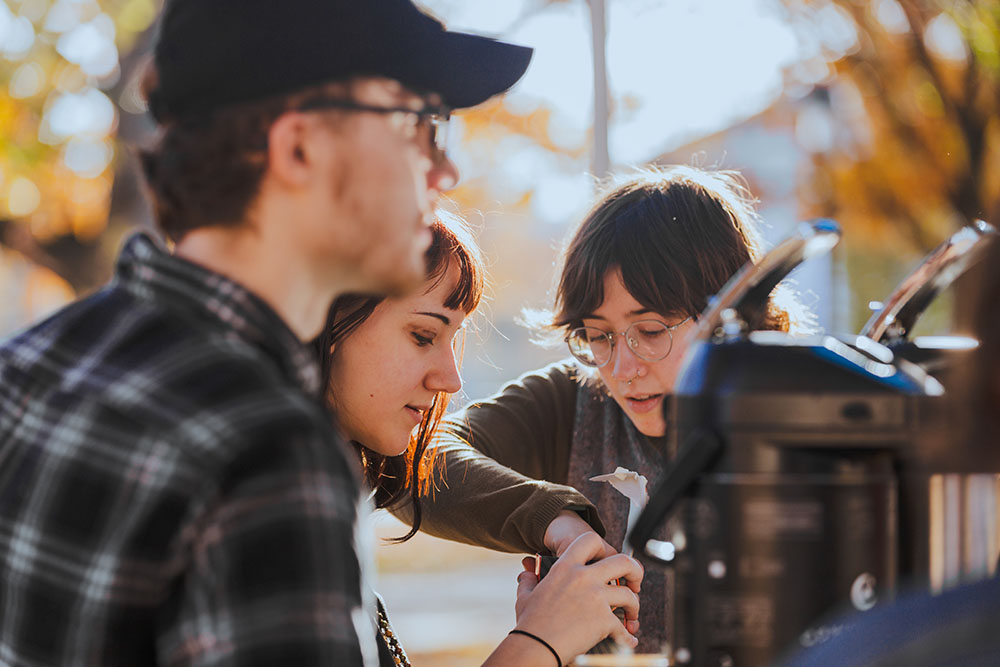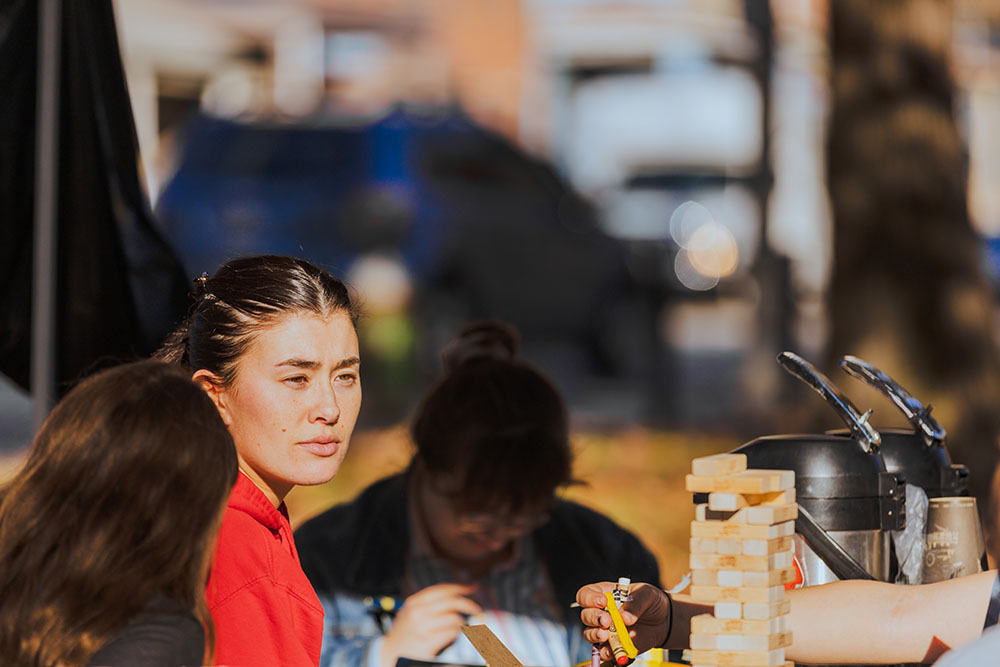Through the Department of Psychology's Mobile Thriving Respite, Students Build Meaningful Connections with Pittsburgh's Street Community

Point Park University students from various psychology programs hosted a Mobile Thriving Respite event in Allegheny Commons Park on the Northside this fall. The initiative has been awarded a $24K grant from Staunton Farm Foundation, which will enable students and faculty to bolster outreach efforts in the street community of Pittsburgh. Photo by Ethan Stoner '26.
Spotted lanternflies, celebrity drama and family: The topics Kay Karlie covered in conversation with a member of Pittsburgh's street community at a Mobile Thriving Respite event ran the gamut.
"Going to the Respite has shown me just how much I have in common with other people who I might not otherwise have the chance to interact with," said Karlie '24, a Meyersdale Area High School graduate and psychology major. "It has enhanced my experience and understanding of the social world, not just in an educational sense, but also in an everyday experience."
The Mobile Thriving Respite is a community-based action initiative in Point Park University's Department of Psychology. Launched in 2019 by Robert McInerney, Ph.D., professor and undergraduate coordinator of the psychology program, and Point Park psychology students, the Respite seeks to help members of the street community thrive, not just survive, by hosting free events in parks and other locations around the city and providing cultural, educational and psychological resources. Events include sharing stories over coffee, playing board games and cards and listening to music. The initiative recently received a $24K grant from the Staunton Farm Foundation to expand its reach and frequency.
"The Mobile Thriving Respite is a place where we try to be with people as they are," Karlie said. "We may have differences, but we show up, sit down and drink coffee together anyway. We come to our events as resolute enjoyers of others’ company."
The Respite exemplifies Point Park's humanistic approach to psychology, which integrates psychological and sociocultural levels of analyses to explore a more holistic view of the person through their individual and collective experiences.
"Point Park University’s psychology program is unlike any other program," Karlie said. "It is critical, humanistic and radical. It does not teach mainstream psychology, but a more intentional, socially-aware form of psychology that is ultimately more interesting and more enjoyable to learn."
Classes like critical social psychology and community psychology have been crucial in supporting Karlie's understanding of why the Respite's work is valuable.
"This work is important because it addresses a need that usually goes unaddressed: the need for community," Karlie said. "In order to thrive, one does not only need food, water and shelter. We also need the company of others."
In the Q&A below, students from several of the Department of Psychology's degree programs share the experiences they've had through their work with the Respite.

Sam Spano '25
Major: B.A. in Psychology
Hometown: Belle Vernon, Pa.
High school: Belle Vernon Area High School
How have you applied what you’ve learned in your psychology courses to your work with the Respite?
By utilizing concepts and theories learned within the classroom, I find myself letting go of whatever notion my ego makes or feels and losing myself in the experience of offering an open, honest dialogue that allows others to simply be who they are. I get to better understand and acknowledge the lived experience of another without any preconceived notions, without any judgment, while also shifting my perspective to one of common understanding and vulnerability.
Through the Respite, I have learned to not just accept but appreciate the alterity of another human being. This hands-on engagement with the community has benefitted my educational experience by allowing me to put concepts and theories into action in a real way that is positively impactful.
Was there a particular experience you’ve had that reaffirmed your interest in this work?
Seeing the joy on people’s faces. When I first started getting involved in the Respite, seeing the smiles, hearing the laughter and holding meaningful conversations with people who are much wiser and more experienced than me solidified my commitment to doing this work. If I can offer up a space or even just a second of a moment that lifts the spirits of another person, then I'm happy.
What else do you think people should know about the Respite?
None of us are doing this for our own narcissistic pleasures or to feel in any way morally superior. We are not trying to come in on a moral high ground in a way that condescends. We are doing it because we have the resources and opportunity to do it, not because work like this may look good on a resume or to a future employer. We are just trying our best to hopefully provide a space rooted in kindness, generosity, sincerity and tact.

Julia Pugar '24
Major: M.A. in Community Psychology
Hometown: Pittsburgh, Pa.
High school: Shaler Area High School
Describe a meaningful moment you've had through your work with the Respite.
One takeaway is that we have all made friendships. There is a connection I made with an older gentleman who calls me every Saturday to catch up and talk about upcoming Respite events. He raves about our homemade cookies, laughs about losing or winning bingo and talks about how much fun he has had with us. He ends the phone call every time with the statement, "I love ya. You all are my medicine." Knowing that we come to this shared space to just be with each other, we never expect an event to go a certain way, but they are all uniquely moving. It moves me towards connection and brings me so much fulfillment to know others have enjoyed it as much as we have.
The Respite has added so much value to my life by introducing me to wonderful people in these communities we’ve engaged with. Every Friday, I know I get to meet up with familiar faces and new ones and talk about life, share stories over a cup of coffee and laugh over games. It restores my faith in human connection and the importance behind it.
What else do you think people should know about the Respite?
The Respite events are a lot of work – from planning, getting resources, asking for donations, making connections with local businesses and many other small details that help events run smoothly. The Respite is a small group of students who are so passionate about keeping this going, along with Dr. McInerney’s guidance and resources. We do this because we love it and couldn’t imagine not doing it. It was fantastic when we received the grant, but all the members said with or without the grant, we would continue this work. The Mobile Thriving Respite has been my favorite component of my time as a Point Park student.
Why would you recommend Point Park University’s Department of Psychology to a prospective student?
The faculty. They are some of the most fun, inspiring and caring educators I’ve ever met. Students can expect their contributions to class discussion to be respected and honored. It can be very intimidating in a college lecture to speak up, but the faculty here have made my time as a student so enjoyable. I will always have pleasurable memories of being in class with Dr. McInerney and Sarah Schulz, Ph.D.

Autumn Vick '26
Major: Doctorate in Clinical Psychology (Psy.D.)
Hometown: Dallas, Texas
High school: First Baptist Academy
Why did you want to get involved with the Mobile Thriving Respite?
Insights from past alumni, faculty and peers introduced me to the program's commitment to fostering hospitality and community. The emphasis on nurturing individuals towards thriving, rather than mere survival, deeply resonated with me. Moreover, the predominantly student-driven nature of this organization piqued my interest. Drawing from prior involvement with similar demographics, I perceived this opportunity as a tangible and enjoyable prospect where I could contribute meaningfully through assistance and participation.
How have you applied what you’ve learned in the classroom to your work with the Respite?
My academic focus on trauma within coursework, research and clinical practicum experiences has significantly influenced my approach and engagement during Respite events. Complementing this, the Psy.D. program's curriculum, particularly the emphasis on community psychology through two specialized classes (including a community practicum), provided a theoretical foundation that I could translate into practical, hopeful and impactful actions.
Interacting with event attendees, I recognized the profound lack of care and empathy many had endured, prompting me to offer genuine support and connection, whether through casual conversations over coffee or engaging in activities like playing UNO. Witnessing the transformative effects on their countenance and demeanor reinforced my conviction to serve individuals who have been unjustly marginalized and denied compassion.
Learn more about Point Park's Department of Psychology:
- Faculty Q&A: Rachel Battaglia, Psy.D., Visiting Assistant Professor of Psychology
- Get Career-Ready with: Haze Basped '26, Psychology Major and Behavioral Sciences Minor
- Psychology Faculty and Students Publish Research in APA Handbook of Humanistic and Existential Psychology
- Psychology Students Engage in Advocacy-Driven Research with Abolitionist Law Center Court Watch
- Mobile Thriving Respite Connects Theory to Practice for Psychology Students
@pointparku What do our students 💚 about studying psychology at Point Park University? Members of the Confluence Psychology Alliance share their thoughts 📣 #PointParkU #PointParkUniversity #psychologymajor #psychmajor #psychologydegree #psychologydepartment ♬ original sound - Point Park Univ.

